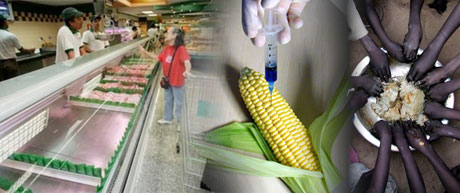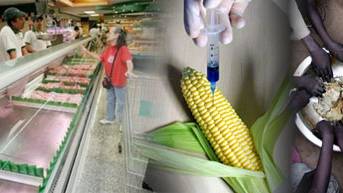U.S. using food crisis to boost bio-engineered crops
Source: chicagotribune.com

The Bush administration has slipped a controversial ingredient into the $770 million aid package it recently proposed to ease the world food crisis, adding language that would promote the use of genetically modified crops in food-deprived countries.
The value of genetically modified, or bio-engineered, food is an intensely disputed issue in the U.S. and in Europe, where many countries have banned foods made from genetically modified organisms, or GMOs.
Proponents say that GMO crops can result in higher yields from plants that are hardier in harsh climates, like those found in hungry African nations.
"We certainly think that it is established fact that a number of bio-engineered crops have shown themselves to increase yields through their drought resistance and pest resistance," said Dan Price, a food aid expert on the White House's National Security Council.
Problems anticipated
Opponents of GMO crops say they can cause unforeseen medical problems. They also contend that the administration's plan is aimed at helping American agribusinesses.
"This is a hot topic now with the food crisis," said Ronnie Cummins, national director of the Organic Consumers Association. "I think it's pretty obvious at this point that genetically engineered crops—they may do a number of things, but they don't increase yields. There are no commercialized crops that are designed to deal with the climate crisis."
President George W. Bush proposed the food package two weeks ago as aid groups and the UN World Food Program pressed Western governments to provide additional funds to bridge the gap caused by rising food prices. The aid must win congressional approval.
It would direct the U.S. Agency for International Development to spend $150 million of the total aid package on development farming, which would include the use of GMO crops.
The U.S. is the UN food program's largest donor, providing nearly half the help the group receives from governments. It gave about $1.1 billion to the WFP in both 2006 and 2007. The WFP provided $2.6 billion in aid in 2006.
In April, Secretary of State Condoleezza Rice suggested at a Peace Corps conference that "we need to look again at some of the issues concerning technology and food production. I know that GMOs are not popular around the world, but there are places that drought-resistant crops should be a part of the answer."
Some aid organizations agree that it is time to consider GMO crops.
"I think it's good, that it should be part of the package," said Mark Rosegrant, an environment and technology specialist with the International Food Policy Research Institute. "It shouldn't be the only thing in the package. It is now showing quite a bit of potential in starting to address some of the long-term stresses, drought and heat."
But Noah Zerbe, an assistant professor of government and politics at Humboldt State University in California, said that GMO crops might not be appropriate for developing countries.
"You get fantastic yields if you're able to apply fertilizer and water at the right times, and herbicides to go along with that," Zerbe said. "Unfortunately, most African farmers, they can't afford these inputs."
Africa ambivalent
The U.S. tried to introduce GMO crops to Africa in 2002, with mixed results. European Union opposition was part of the reason that several African nations that year balked at an offer of U.S. aid that included corn, some of which was genetically modified.
In a severe drought, Zambia rejected the U.S. aid altogether. Several other countries accepted the U.S. corn, but only after it was milled.
The NSC's Price said the administration is working to persuade European nations to lift their objection to the use of GMO crops in Africa. Rosegrant of the research institute said that, given current food shortages, new bio-safety measures could resolve such problems.
"There's evidence that those fears tend to be overblown," Rosegrant said.
Article from: http://www.chicagotribune.com/news/
nationworld/chi-food-crops_14may14%2C0%2C7229990.story






















